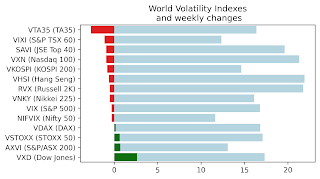Part 1 here, part 3 here. Everyone knows that VIX futures (and ETFs) do not move one to one with the index. Given the complicated dynamics of the index - jumps, multiple regimes, mean-reversion - it is actually not surprising that replicating the index in a tradable instrument is not trivial. However there's very little info about quantifying the relationship.
In this excellent article surlytrader talks about imperfect correlation between VIX futures and the index, writing "... VIX futures become less correlated to the spot VIX index as you move further out in expirations. ... By investing further out on the curve, we do not capture as much of the movements of the VIX spot index. On the flip side, by investing further out on the curve, we lose less as the futures contract ages." Surlytrader also provides a plot with schematic depiction of correlation declining with time to maturity. In the plot he calls it VIX Beta, but I thought that VIX Delta would be more in line with the convention.
To explain the relationship I created an applet that quantifies and illustrates this dynamic relationship between futures prices, tenor, and correlation to the index. One of the most intuitive features is the effect of mean-reversion parameter on the price and delta. When mean reversion is large VIX futures converge quickly to their long-term level, and delta quickly decays toward 0. When mean-reversion is small (e.g. like it is in the stock market) then more familiar dynamics emerge - futures are "connected" to the index level, and correlation is high.
If you do not see the applet above you may need to download shockwave player from Adobe (same company that makes Flash player, and Pdf reader)
One of the practical applications of VIX futures delta is trading calendar spreads on VIX futures /options / ETFs, and measuring position risk.
Subscribe to:
Post Comments (Atom)
Weekly market report
Wall st delivered a mixed bag of news with VIX, VNKY, and VSTOXX and their underlying markets almost unchanged. VXD - volatility index based...

-
John “Hojun” Hwang is the author of VIX, VIX Futures, and VIX ETNs, a conceptual guide to trading the VIX index. He graduated with degrees i...
-
This week 's market movements were largely driven by renewed recession fears in the wake of a sharp rise in office v...
-
Wall st delivered a mixed bag of news with VIX, VNKY, and VSTOXX and their underlying markets almost unchanged. VXD - volatility index based...


No comments:
Post a Comment